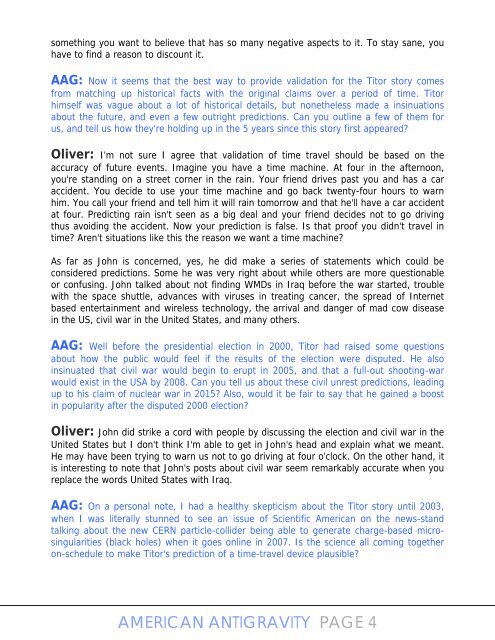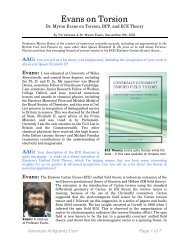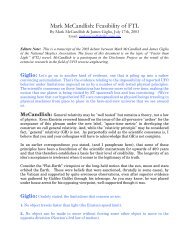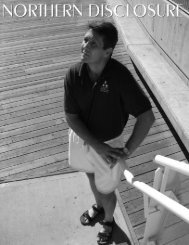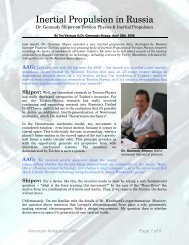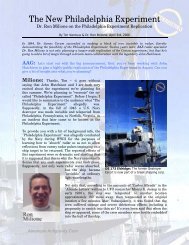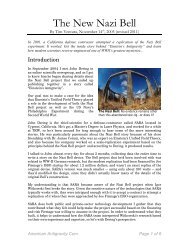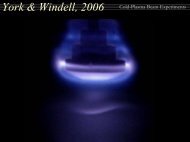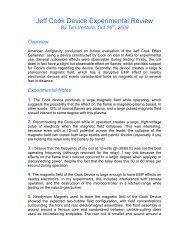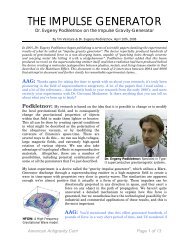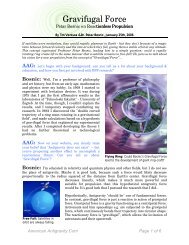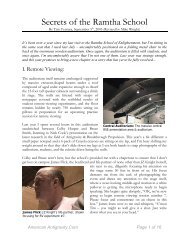John-Titor-Interview.. - American Antigravity
John-Titor-Interview.. - American Antigravity
John-Titor-Interview.. - American Antigravity
You also want an ePaper? Increase the reach of your titles
YUMPU automatically turns print PDFs into web optimized ePapers that Google loves.
something you want to believe that has so many negative aspects to it. To stay sane, you<br />
have to find a reason to discount it.<br />
AAG: Now it seems that the best way to provide validation for the <strong>Titor</strong> story comes<br />
from matching up historical facts with the original claims over a period of time. <strong>Titor</strong><br />
himself was vague about a lot of historical details, but nonetheless made a insinuations<br />
about the future, and even a few outright predictions. Can you outline a few of them for<br />
us, and tell us how they're holding up in the 5 years since this story first appeared?<br />
Oliver: I'm not sure I agree that validation of time travel should be based on the<br />
accuracy of future events. Imagine you have a time machine. At four in the afternoon,<br />
you're standing on a street corner in the rain. Your friend drives past you and has a car<br />
accident. You decide to use your time machine and go back twenty-four hours to warn<br />
him. You call your friend and tell him it will rain tomorrow and that he'll have a car accident<br />
at four. Predicting rain isn't seen as a big deal and your friend decides not to go driving<br />
thus avoiding the accident. Now your prediction is false. Is that proof you didn't travel in<br />
time? Aren't situations like this the reason we want a time machine?<br />
As far as <strong>John</strong> is concerned, yes, he did make a series of statements which could be<br />
considered predictions. Some he was very right about while others are more questionable<br />
or confusing. <strong>John</strong> talked about not finding WMDs in Iraq before the war started, trouble<br />
with the space shuttle, advances with viruses in treating cancer, the spread of Internet<br />
based entertainment and wireless technology, the arrival and danger of mad cow disease<br />
in the US, civil war in the United States, and many others.<br />
AAG: Well before the presidential election in 2000, <strong>Titor</strong> had raised some questions<br />
about how the public would feel if the results of the election were disputed. He also<br />
insinuated that civil war would begin to erupt in 2005, and that a full-out shooting-war<br />
would exist in the USA by 2008. Can you tell us about these civil unrest predictions, leading<br />
up to his claim of nuclear war in 2015? Also, would it be fair to say that he gained a boost<br />
in popularity after the disputed 2000 election?<br />
Oliver: <strong>John</strong> did strike a cord with people by discussing the election and civil war in the<br />
United States but I don't think I'm able to get in <strong>John</strong>'s head and explain what we meant.<br />
He may have been trying to warn us not to go driving at four o'clock. On the other hand, it<br />
is interesting to note that <strong>John</strong>'s posts about civil war seem remarkably accurate when you<br />
replace the words United States with Iraq.<br />
AAG: On a personal note, I had a healthy skepticism about the <strong>Titor</strong> story until 2003,<br />
when I was literally stunned to see an issue of Scientific <strong>American</strong> on the news-stand<br />
talking about the new CERN particle-collider being able to generate charge-based microsingularities<br />
(black holes) when it goes online in 2007. Is the science all coming together<br />
on-schedule to make <strong>Titor</strong>'s prediction of a time-travel device plausible?<br />
AMERICAN ANTIGRAVITY PAGE 4


